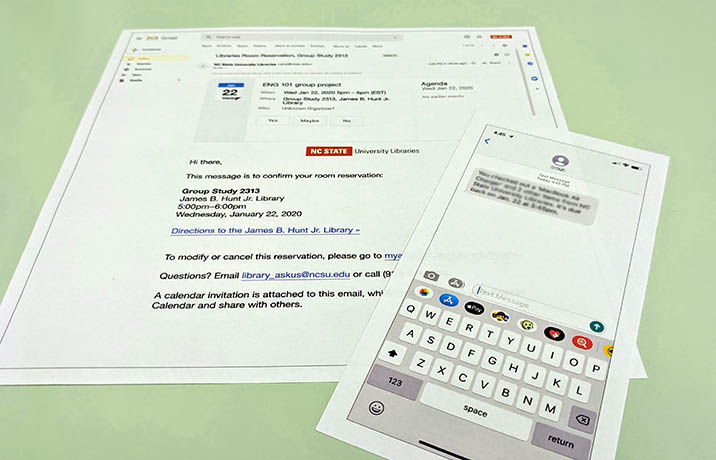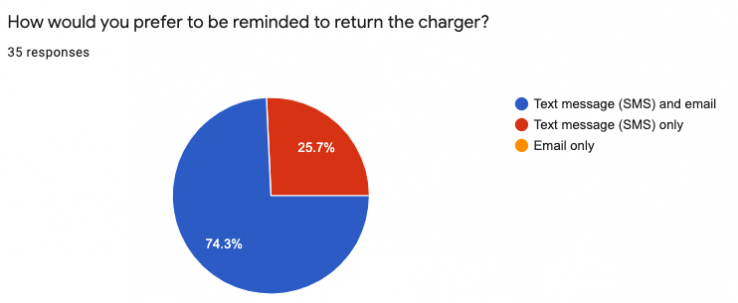Communication + Tiny Café
We conducted a brief survey and interview with participants to find out how they prefer to be contacted by the Libraries. Participants responded positively to prototypes of both text messages and emails regarding room reservations and upcoming due dates.

Overview
The Libraries currently communicates with users by automated emails to let them know about upcoming due dates, room reservations, and other time-sensitive information. We wanted to know how to improve this communication, and whether we should pursue other options, too.
Questions and findings
We showed participants paper prototypes of improved emails and text messages. Overall, participants had very positive feedback about the prototypes of text message communications. The Libraries does not currently offer this, but we may pursue the possibility. Participants also had positive feedback regarding prototypes of improved emails.
Would users prefer to be contacted by the Libraries via text message (SMS), email, or both?
We put forth a scenario to participants: Let's say you borrowed a phone charger from the library. It's overdue and you're about to be charged for it.

When asked how they would prefer to be reminded to return a phone charger that's about to be overdue:
- 74% of participants (26 out of 35) said they would prefer both text message and email
- 26% (9 out of 35) said they preferred text message only
- No participant indicated a preference for communication by email only
What information do users expect in email communications?
Policies: Many participants pointed out that they wished more information were communicated in automated due-date emails, including late fine policies and information about returning items to different library locations. Some immediate improvements can be made to email communications based on this finding.
Subject lines: For some items that are about to be due, our automated emails currently have the subject line "Library item(s) due soon." Our prototypes prioritized highly informative subject lines, such as "Due at 5:00pm: Apple laptop and 2 items." Ten out of 16 participants (63%) said they would not need to open an email with that subject line to understand the thrust of the email and act upon it.
What kinds of interactions do users expect in text communications?
Most people did not expect to be able to text back to an automated text message about due dates or a room reservation. This expectation is set by other services they use that text them.
How We Did It
We used the Tiny Café model. We set up a table with coffee and pastries from Panera in the lobbies of the Hill and Hunt Libraries. We offered these treats to passing library patrons in exchange for 10 minutes of their time. In total, 35 people participated.
We made four prototypes total, printed on paper.

Each participant only looked at two prototypes, either a text and email about room reservations or a text and email about short-term tech lending. We asked for their feedback and presented scenarios to gauge how they would act on the limited information presented in the texts and emails.
Team
 Cole HudsonFormer Discovery Systems Manager
Cole HudsonFormer Discovery Systems Manager Mia PartlowResource Sharing Librarian
Mia PartlowResource Sharing Librarian Silvia SheffieldCollections & Research Librarian for Engineering
Silvia SheffieldCollections & Research Librarian for Engineering Robin DavisAssociate Head, User Experience
Robin DavisAssociate Head, User Experience
 Krystal KimmelAsk Us student worker
Krystal KimmelAsk Us student worker